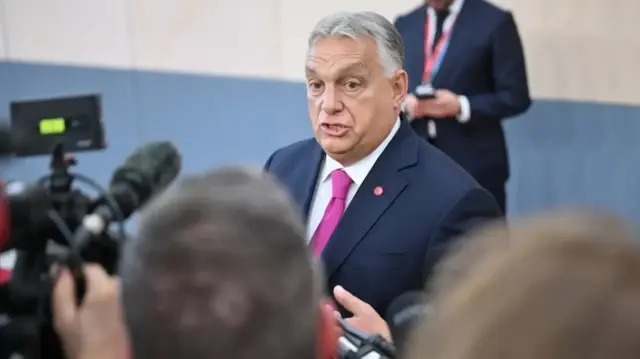Polish, Hungarian premiers clash in Copenhagen over Russian threat, Ukraine war

Viktor Orban argues main danger to Europe is economic stagnation, declining competitiveness, not Moscow
Polish Prime Minister Donald Tusk and his Hungarian counterpart Viktor Orban engaged in a sharp exchange on Thursday on the nature of threats facing Europe and the Russia-Ukraine war.
Reklam yükleniyor...
Reklam yükleniyor...
Speaking during a dialogue in Copenhagen, Orban argued that the main danger to Europe was not Moscow, but economic stagnation and declining competitiveness.
“Economic stagnation and losing competitiveness -- this is the danger,” Orban said, adding that Europe remains stronger than Russia in population, GDP and military spending.
“We have more than 400 million people. Russia has 130 and something,” he said. “We spend altogether, 27 countries, more on military spending than the Russians. So, why are we afraid? We are stronger than they are,” he said.
Orban stressed that the challenge for Europe was not Russia’s strength, but a lack of leadership and unity.
“The question is whether we have leadership to come together and to defend our interests together. That’s what we should do anyway,” he said.
Tusk countered by stressing that the war in Ukraine is also Europe’s war, citing repeated violations of Polish airspace, hybrid tactics and border tensions with Belarus.
“After the latest events in Poland, I mean the violation of our airspace, this is something very concrete. And the Russian aggression against Ukraine as well,” he said. “This is why the possible consequences of a Russian victory will be dramatically dangerous for Europe and for the whole West. … Yes, this is also our war. In Poland, no one has doubts on this.”
Later, the Polish premier took a more direct swipe at his Hungarian counterpart.
“Viktor Orban believes there is no war. I believe there is a war. And the question is, whose side are you on in this war? We know whose side Poland is on, we know whose side NATO and Europe are on, and unfortunately, we probably also know whose side Viktor Orban is on,” he said.
Reklam yükleniyor...
Reklam yükleniyor...







Comments you share on our site are a valuable resource for other users. Please be respectful of different opinions and other users. Avoid using rude, aggressive, derogatory, or discriminatory language.